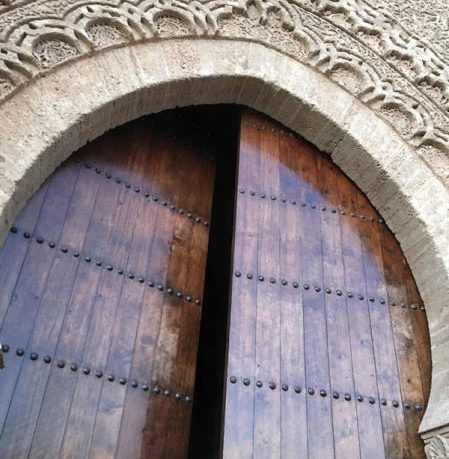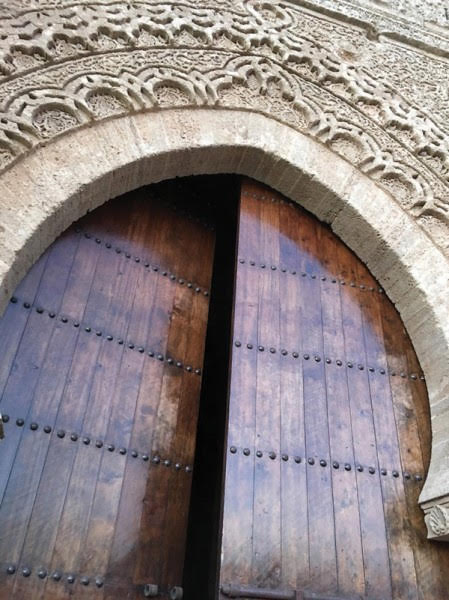New Jersey Jewich News
by Lori Silberman Brauner
NJJN Staff Writer
Will the community’s legacy ensure its future?
Morocco’s Jewish community has declined from its heyday of 250,000 people in the 1950s to a few thousand today, but its vibrant past continues to be a draw for Jewish visitors and a selling point to encourage tourism.
Although the Jewish population has diminished significantly since the creation of the State of Israel in 1948 and the independence of Morocco from France in 1956, Jews maintain a visible presence in the kingdom, from King Mohammed VI’s senior adviser André Azoulay to the Israeli tour groups traveling around the country; and in areas frequented by Jewish tourists, it is common to find young Moroccans offering directions in Hebrew or showing off their language skills to visitors.
Our own delegation of Jewish journalists, hosted by the Moroccan National Tourist Office for nine days in November, were even featured in an article about Jewish tourism in Morocco’s daily newspaper Le Matin — whose dateline includes months and dates in the Muslim, Western, and Jewish calendars.
Despite the lack of diplomatic relations and direct flights to Israel (Israelis, who must obtain a visa to enter Morocco, currently travel through a third country such as Spain), Abderrafie Zouitene, the CEO of the Moroccan National Tourist Office, expressed optimism that direct flights to Tel Aviv would be launched within a few years. “We have to be very open,” he said, and “tourism is very important for that.” (On Nov. 30, he left his post; Rachid Hamzaoui, the agency’s finance and administrative director, has been named interim director-general).
Morocco has become a hot tourist destination in recent years, with 11.3 million people visiting in 2017 and 11.5 million expected for 2018, according to the Tourism Ministry. Some 51 million people have visited the country over the last five years.
Zouitene, like many Moroccans we met during our nine-day trip, was quick to remind us how Sultan Mohammed V, who later became King Mohammed V, refused to deport Jews when the country was under the rule of Vichy France, whose leaders collaborated with the Nazis during World War II. Among the Vichy government’s first acts was to impose anti-Semitic laws in Morocco, as per Nazi protocol. The sultan is famously reported to have said in response to the government’s request for lists of Jews: “There are no Jews in Morocco…there are only Moroccan subjects.”
A spirit of coexistence is even enshrined in the law. The preamble of Morocco’s 2011 constitution, which was approved by a referendum, states: “A sovereign Muslim State, attached to its national unity and territorial integrity, the Kingdom of Morocco shall seek to preserve its diverse, indivisible national identity. Its unity, which is built on the convergence of its Arab-Islamic, Amazigh (Berber), and Saharan-Hassani components, is nourished and enriched by its African, Andalusian, Hebraic and Mediterranean constituents.”
Varying figures are given for the number of Morocco’s Jews, whose presence dates as far back as the destruction of the second Temple in Jerusalem 2,000 years ago. According to Hebrew University demographer Sergio DellaPergola, there were an estimated 2,300 Jews in Morocco as of 2015, with the largest concentration in Casablanca, with 1,000 Jews. Smaller Jewish communities, according to DellaPergola, exist in Rabat (400), Marrakesh (250), Meknes (250), Tangier (150), Fez (150), and Titian (100). There are large expat communities of Moroccans in Israel, France, Canada, and the United States.
Valerie Davis Allouche, senior program manager for Morocco and Tunisia at the American Jewish Joint Distribution Committee (JDC), which supports the humanitarian and social needs of Jewish communities globally, told NJJN in an e-mail interview that there were an estimated 3,500 to 4,000 Jews in Morocco, with smaller communities of more than 60 in Fez and 200 Jews in Marrakesh. “But numbers don’t reveal the vibrancy of these communities, brimming with Jewish activities and leaders who are well-respected and dedicated to ensuring their future,” said Allouche, who is based in Paris.
We met with two of those community leaders in Fez and Marrakesh. Over a kosher dinner at the Fez Centre Maimonide, a Jewish community center, its president, Dr. Armand Guigui, emphasized the cultural events that bring Jews together, including Shabbat dinners held once or twice a month, an international Jewish festival of sacred music, and an international gastronomic festival. Pictures of past social events line the walls of the dining room. Guigui recalled a visit from Britain’s Prince Charles; he offered the prince a kipa but was told he already had one. A physician who mostly serves a non-Jewish patient clientele, Guigui noted that while each Jewish community in Morocco is independent, every three to four years their members get together to meet and exchange ideas. Guigui’s three adult children all live in Paris.
Jacky Kadoch, president of the Marrakech-Essaouira Jewish community, said Marrakesh had 30,000 Jews at one point; now, there are approximately 120 Jews there and a handful, at that, in the coastal city of Essaouira. Charming and well-dressed, Kadoch said he was born in Marrakesh’s mellah, the Jewish quarter of the city’s medina, or walled city, “over 60 years ago.” While they were restricted from moving out of the mellah until Morocco’s independence from France in 1956, Kadoch recalled his excellent relations with Arab neighbors there; they would eat in each other’s homes, and during the end-of-Passover Mimouna festival, Muslims would come and even bring “simanim,” symbolic holiday foods. Once Jews were able to live in more modern neighborhoods such as Gueliz, expanded educational opportunities became available in mainstream French-speaking schools.
Kadoch recalled an example of the king’s unwavering support for the community. In 1989, all street names in the mellah with Jewish names were removed by the governor in an effort to “Arabize” the community. After the king got wind of this, he ordered the streets to be restored to their original names. Kadoch also noted a new project in Marrakesh to build a synagogue/community center next to a church and mosque that he wishes, “b’ezrat Hashem,” to happen within the next two years.
Despite the good relations with the king, Kadoch acknowledged it is “only a dream” that the Jews, despite the thousands of Moroccan expats who visit for holidays such as Passover and to pray at graves of revered rabbis, will come back for good. Most Jewish young people who study overseas remain abroad afterward, and he acknowledged there is no viable community outside of Casablanca. “All of the cities [are] finished.”
Of Kadoch’s own three children, two live abroad with their families. His middle son, 32, returned to Morocco after completing his degree. Why does Kadoch remain? “Because I have my responsibilities in the community,” he said, which include overseeing the needs of poor people in partnership with the JDC.
Acknowledging the “large, aging population in this community,” Allouche said the JDC works “together with the community to ensure the highest-quality care, including an old-age home that has recently acquired a fully-equipped physical therapy room.” Additionally, “we help provide subsidized housing and basic goods for the poorer members of the community, ensure holiday celebrations for those who cannot afford them, and medical services for a variety of age groups and socio-economic levels.”
But in Casablanca, at least, there is more of a Jewish infrastructure, she said, with three Jewish secondary schools, including the Alliance Maimonides, Ecole Normale Hebraique, and Rashi schools. Some of these schools also have Muslim students. A new Jewish community center in the city was also established last September, Allouche said, which “offers a wide variety of activities and events for the whole community.”
“We remain bullish about the Jewish future in Morocco, having the privilege of working with community partners who are eager to ensure that the best education and Jewish communal options are available,” Allouche said. “Yes, young people often travel outside of Morocco for higher education and certain job opportunities, but they are very fortunate to have a wide variety of choices for Jewish life if they stay or return.”
While security remains a concern in Morocco, Allouche said the community is “blessed with Jewish leadership and a government, led by King Mohammed VI, that is proactively dedicated to its security and takes many measures to protect Jews living in the country.” During our journalists’ visit, we had police escorts in areas such as the mellah and Jewish cemetery in Meknes.
From the national to neighborhood level, “the country takes security very seriously,” said Jason Isaacson, associate executive director for policy and managing director of government and international affairs at American Jewish Committee. Isaacson, who visits the country for meetings at least once a year, added, “I have always felt safe in Morocco.”
And while the ongoing Israeli-Palestinian conflict precludes the establishment of diplomatic relations between Morocco and Israel (for example, after President Donald Trump issued his statement recognizing Jerusalem as Israel’s capital, street-level protests erupted in Morocco), “if you talk to educated Moroccans,” he said, “there’s also a real appreciation of the Jewish history in Morocco and also the potential relationship with Israel.” He cited the creation of the Association Mimouna (whose title references the end-of-Passover holiday), a group of young, globally-oriented Moroccan Muslims who are interested in teaching Moroccan society about the country’s rich Jewish heritage; hundreds of young people are active in it.
As for the encouragement of more political contact between Moroccans and Israelis, Isaacson said, “Morocco is not yet ready to establish formal relations with Israel, but that should not inhibit political contact” to discuss common challenges and opportunities. He cited “ongoing engagement” with public officials and “receptivity.” While there is great “sympathy for the Palestinian cause” in Morocco, Israelis of Moroccan roots “find ways to make business happen” there, and “we hope to encourage more of that, and political dialogue.”
Noting the “pride in the diverse heritage of their country,” Isaacson, who was named Chevalier of the Order of the Throne of the Kingdom of Morocco by Mohammed VI, said, “Before Islam came to Morocco, there were Jews.”








